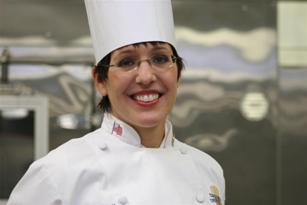In the Lap of Luxury—Working as a Private Chef
17 December 2009By Lynn Schwartz
 What’s the difference between a private chef and a personal chef? Audrey Heckwolf of Grand Rapids Community College, who cooked for a Fortune 500 family, can tell you.
What’s the difference between a private chef and a personal chef? Audrey Heckwolf of Grand Rapids Community College, who cooked for a Fortune 500 family, can tell you.
Private chef and personal chef are titles that evoke “glamour job” images—globetrotting with celebrity employers and preparing ultra-luxe dinners for very important people. But do we really understand what these jobs entail? Audrey Heckwolf, a former private chef, says, “Most chefs don’t know. And they don’t know the difference between a private and personal chef. This is a growing part of the culinary industry. Chefs need to educate each other and their clients about the differences.”
Simply put, a private chef works for one family. “Private chefs are owned by their employer,” says Heckwolf, who worked for an affluent, Fortune 500 family for six years. “They are at their beck and call.” A personal chef is not. The personal chef can be described as a small business owner. “These chefs design their own businesses, they are responsible for not only the meals and private parties of several clients, but also for typical small business duties like marketing and bookkeeping,” says Heckwolf. Personal chefs may offer general menus or choose to focus on special dietary needs such as meals for diabetics or those with heart problems.
What It Takes
“It’s a niche market. Unless you’ve lived it, people don’t understand what it takes to be a private chef.” Heckwolf is referring to the many diverse duties the position requires. “Most chefs want to cook, but they don’t also want to pack the kids’ lunches while planning a formal dinner for 12.” A private chef must be a multitasking master, and it’s imperative to know both front- and back-of-house skills. One must be knowledgeable about proper table service, guest relations and wine (private chefs often manage the wine cellar) and have good interpersonal skills to deal with other staff members.
The wide scope of the job was a characteristic Heckwolf enjoyed. “Wearing many hats kept me from getting bored.” This can be a struggle for chefs who are not adept at juggling multiple duties while simultaneously getting a meal on the table at the right time. “There is no room for error,” says Heckwolf.
Since these varied responsibilities are not areas that all chefs want to study or practice, Heckwolf says that restaurant chefs can have a difficult time transitioning into private-chef environments. “They can fall on their face,” she says. Women can find the all-encompassing lifestyle challenging as a long-term position. “It’s hard to do this job and have a family of your own since private chefs need to be flexible with their time,” says Heckwolf. “Often positions require a chef to live in and/or travel to multiple family homes.” Heckwolf had Sunday and Mondays off, but time off and schedules vary from household to household.
Families who hire private chefs have a hard time finding an employee who is both qualified to perform the comprehensive duties and who fits into their particular household. “When employers do find the right chemistry, they want to keep the employee and tend to pay high salaries and good benefits, things restaurant workers usually don’t receive,” Heckwolf says. “Depending upon the region of the country, salaries range from $60,000 to well over six figures.”
Is Private Chef the Life for You?
The salary is lucrative, but Heckwolf admits, “You earn every penny.” There is not much freedom (hours will vary, from four-hour days to 16-hour days, depending on the needs of the family). Still, Heckwolf loved not having to work within budget restraints. Clients want what they want without serious concern for food costs. “Private chefs can be very creative, and you deal with the finest in tablewares, food and kitchen equipment.” Depending on the family, dinners can be as intricate as the family requests. Heckwolf prepared a three-course meal every night.
Private chefs also have to be able to travel easily, often on private planes, and know how to conduct themselves in an appropriate manner. Heckwolf’s education (a B.A. in psychology and a two-year culinary degree) and extensive travel experience gave her the confidence, poise and sophistication she needed to present well to the client and their guests and to feel comfortable traveling.
When Heckwolf began to seek employment as a private chef, information was elusive. There were few places to find guidance. “It was like finding a needle in a haystack,” she says. Today, the American Personal & Private Chef Association (APPCA) helps prepare those who wish to choose this unique career path. The association is an important resource since in the past most schools have not offered training in the field.
After six years, Heckwolf left her private-chef position to start her own family. She currently teaches advanced tableservice at The Secchia Institute for Culinary Education at Grand Rapids Community College. Her private-chef experience has provided a strong background that can lead in many directions in the future and is an impressive résumé credit.
To work as a private chef is not for everyone, but for the adventurous spirit, it can be a promising opportunity. “There is a certain level of celebrity that comes with being a private chef,” says Heckwolf. “If you work for a prominent person, you are very popular too. You can write your own ticket.”
Lynn Schwartz is a writer and former New York City restaurateur. She is currently the show manager for The Food & Wine Festival at National Harbor. She is based in Maryland.
Additional Info
- CAFÉ Talks Podcast Lesson Plan: 8
